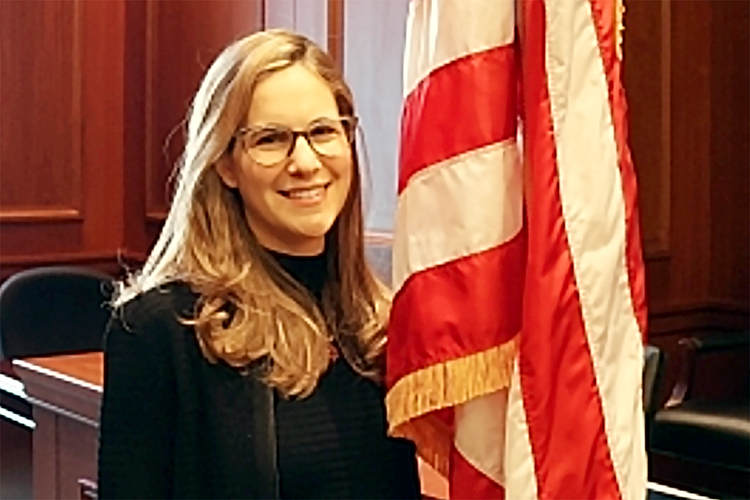Judge accused of using role as charity trustee to donate money to courts, juvenile justice center

Image from Shutterstock.
An ethics complaint has accused an Indiana judge of using his role as a sole trustee for a charitable foundation to pay for tile work and car purchases provided to local courts by his father’s companies.
The complaint against Judge Jason A. Cichowicz of South Bend, Indiana, also claims that he had a conflict of interest when he continued to represent a wealthy client who made Cichowicz the beneficiary of “various trusts and bank accounts.”
The ethics charges stem from Cichowicz’s relationship with Levering Russell Cartwright, which began before Cichowicz became a judge in January 2019, according to the ethics complaint filed Feb. 7 by the Indiana Commission on Judicial Qualifications. The seven-count complaint alleges misconduct while Cichowicz was a lawyer and as a judge, according to a Feb. 7 press release.
Cartwright’s parents had set up two irrevocable trust to provide an income for him. One trust was last valued at more than $10 million, and the other had a value of more than $1 million. Together, the trusts generated about $350,000 to $400,000 in income for Cartwright each year. Cartwright also created a trust with a value of more than $6 million, which was used to secure a loan of about $1.7 million.
Cartwright was also a trustee in a charitable trust set up by his father that was called the C Foundation.
Cichowicz had represented Cartwright in a divorce in 2013, when Cartwright was 73 years old. He continued to represent Cartwright in litigation over a 2015 settlement agreement and other post-dissolution matters. Cichowicz didn’t withdraw as counsel in the divorce litigation until December 2018, shortly before he took office in January 2019.
While Cichowicz was still representing Cartwright, Cartwright gave Cichowicz power of attorney with broad powers to transfer and exchange trust properties, made Cichowicz the sole trustee of the C Foundation, made Cichowicz the residual beneficiary and successor trustee of his revocable trust, and made Cichowicz a joint owner of his personal checking account with rights of survivorship, according to the ethics complaint.
After he became a judge, Cichowicz used his position as trustee of the C Foundation to secure a line of credit to build a new courtroom. He also used the foundation to pay for tile work to remodel break rooms that was performed by his father’s company and to buy three cars from his father’s company for the Court Appointed Special Advocates program.
Cichowicz hid the source of the funds by using lines of credit and depositing the money into a law firm trust account, according to the ethics complaint. The money was then given to the Friends of the St. Joseph County Juvenile Justice Center, which in turn paid for the projects.
Cichowicz also became the beneficiary of a Cartwright Individual Retirement account after he became a judge, according to the complaint.
Cichowicz obtained a personal loan in December 2020 to pay off Cartwright’s debt of $1.7 million. That same month, he told the bank holding Cartwright’s funds to transfer all Cartwright’s revocable trust assets to Cichowicz’s personal financial account. At the time, Cartwright’s assets were more than $6 million.
The ethics complaint does not state whether Cichowicz received the money. But court opinions (here and here) indicate that Bank of America suspected elder abuse, blocked the transfer under its investment services agreement, and sought a declaratory judgment on its responsibilities.
The bank had encouraged Cartwright not to make the transfer because the money provided for his living expenses and had warned him that he had to pay off a loan secured by trust assets before he could transfer the money, the opinions said.
Bank of America, Cartwright and other parties agreed to dismiss the case in November 2022. The South Bend Tribune indicates that the case has settled.
The lawyer representing Cichowicz, Donald R. Lundberg, gave this statement to the ABA Journal: “Judge Jason Cichowicz successfully and legally obtained private funds to improve his court at no cost to the taxpayer and at no personal benefit to himself. The commission’s own statement of charges correctly asserts that Judge Cichowicz’s interest was in making improvements that would be beneficial to the important work of the St. Joseph probate court and the families and children it serves. Judge Cichowicz fully cooperated with the judicial qualifications commission’s investigation that took well over a year. He is disappointed that his long-standing and close friendship with Russell Cartwright, who never complained to the judicial qualifications commission, would be subject to criticism. The judge looks forward to presenting his side of the case to a panel of three independent judges who will decide whether the commission’s or his and his lawyers’ interpretation of the [Indiana] Code of Judicial Conduct is correct.”
Cartwright’s lawyer, Michael Misch, provided a statement to the Indiana Lawyer that said his client was “shocked to learn” of the ethics investigation.
“Mr. Cartwright has always held Judge Cichowicz in the highest regard and regards him as a family member,” the statement said. Cartwright has always maintained that Cichowicz was acting on his behalf, according to the statement.
Cichowicz acted “in the best interest of our community and the children and families served” by the juvenile justice center, the statement said. “It says a lot that Mr. Cartwright is the alleged victim in this case, yet none of the accusers have once sat down with him or asked his opinion. He has repeatedly rejected the notion that Judge Cichowicz has done anything wrong and stands by him 100%.”
Write a letter to the editor, share a story tip or update, or report an error.


